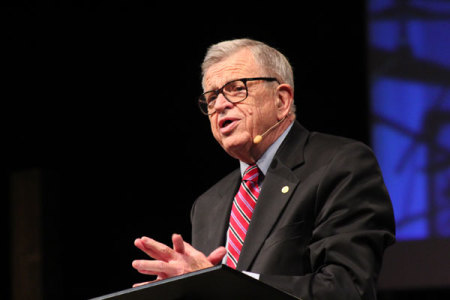Chuck Colson Influences Prison Reform Even After Death Through Task Force Named in His Honor

More than four decades ago, the Watergate scandal rocked the nation, eventually moving Charles Colson, then known as Nixon's "dirty tricks" man, to step down from the White House. In that dark personal hour, a friend showed him that the apparent end of his political career was in fact a window opening up to a new life — one defined by the grace of the Gospel message.
After becoming a Christian, Colson pled guilty to obstruction of justice and spent 7 months behind bars. In 1976 he founded Prison Fellowship, which today is the nation's largest ministry to prisoners, former prisoners, and their families.

In 2014 Congress honored Colson, who spent the second half of his life promoting biblical values in the public square, by putting his name on a bipartisan, 9-member task force charged with making recommendations to improve outcomes in the federal prison system. I have had the privilege of sitting on the task force, and I believe Colson would be pleased by the spirit of its work.
In an era of extraordinary political division, when Christian values seem conspicuously absent from public life, the Charles Colson Task Force on Federal Corrections has convened with a shared belief that prison can be a place that upholds innate human dignity. We can hold people accountable and, at the same time, prepare them for transformed lives beyond prison.
Colson would not always have felt this way. When he helped launch Nixon into the White House, the Republicans ran on a platform emphasizing the need for more law enforcement and stricter punishments. But once Colson experienced the corrections system from the inside, seeing the true impacts of incarceration on people and their families, he came to believe that the necessity for accountability must be balanced by the hope of redemption for those who have paid their debt to society.
After experiencing God's grace personally, Colson was inspired by William Wilberforce. The famous British parliamentarian worked for decades to end the British slave trade by arguing that Africans were made in the image of God. Likewise, Colson spent many years of his life advocating for reforms — like religious freedom and protection from sexual assault in prison — that would reflect the God-given worth and dignity of each person behind bars.
Although he did not live to see the Task Force, I know he would celebrate its very existence as a hard-won triumph.
After a year of investigatory meetings, the task force delivered its findings and recommendations to Congress, the president, and the attorney general last week. Among its recommendations, we especially welcome the call for a more constructive, rehabilitative culture in federal prisons.
Though our society views a criminal record as an indelible mark, a prison sentence does not cancel the potential of a life. In the Bible, we repeatedly see people who make terrible mistakes but who, by God's grace, go on to play a part in the overarching story of redemption. For example, Moses, who fled Egypt after a murder, became the one to lead the Israelites out of slavery and give the world the Ten Commandments.
At the heart of the Gospel is the chance for dealing with grave mistakes and beginning again. Prison time becomes more effective when, through practices based on enduring values and sound evidence, those responsible for crime can be held accountable, deal with the spiritual roots of criminal behavior, and prepare for lives of purpose beyond prison.
Prison Fellowship also applauds the task force's recommendation that the Federal Bureau of Prisons increase accountability through greater transparency and coordination. Public safety is best served when the federal corrections system focuses on improved outcomes and shares best practices.
We believe Congress has already embraced many of the concepts in the report through the recent reforms passed by both the House and Senate Judiciary Committees. We thank members of Congress, particularly Rep. Goodlatte, R-Va., and Sen. Grassley, R-Iowa, for their leadership in the criminal justice bills currently working their way through the legislative branch and encourage them to continue the bipartisan effort to achieve restorative, values-based reforms.
Charles Colson, once a prisoner, has been an inspiration to many people aching for a second chance. I am one of them. Though my battle with alcoholism once led to two arrests and threatened to derail my career, I am now privileged to be a voice for the voiceless millions affected by crime and incarceration.
Following in Chuck's footsteps, I am using my second chance to help shape meaningful criminal justice reform that protects both public safety and human dignity. Many of those now serving time in our federal prisons can also be prepared to make significant contributions to their families and communities. We should do everything we can — through proportionate punishment, a more restorative prison culture, and other values-based reforms — to help more people make the most of their own second chances.






















